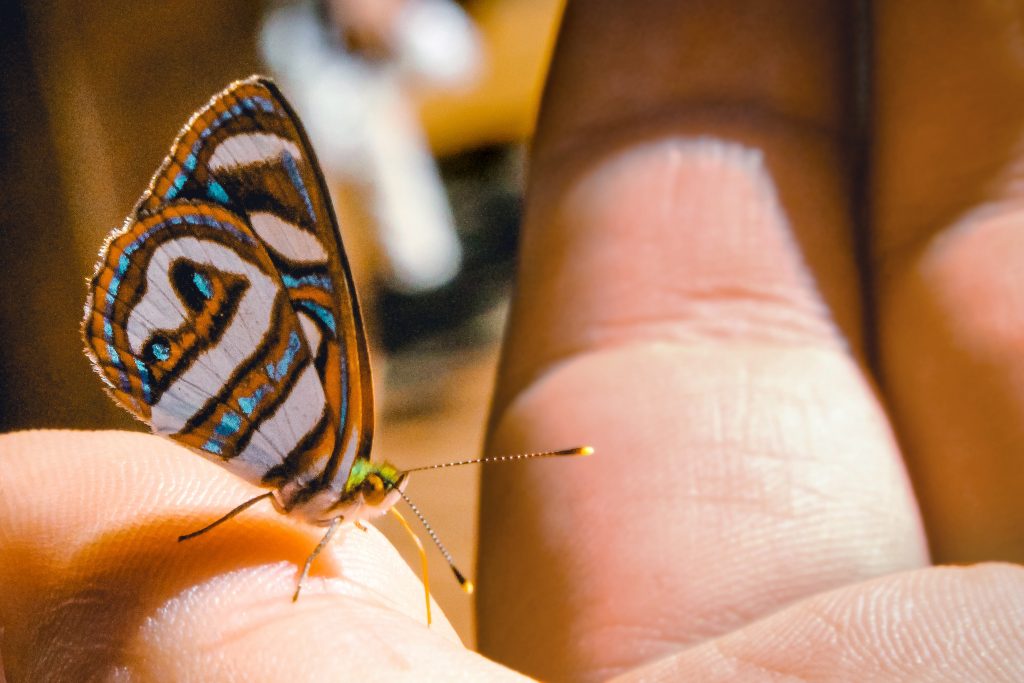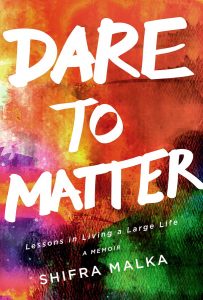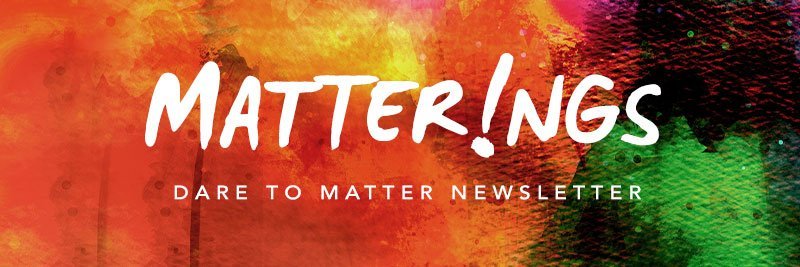Everyone Has a Story: A conversation with Shifra Malka about the release of her new memoir Dare to Matter – Lessons in Living a Large Life.
It was a great honor for me to work with debut author Shifra Malka as she crafted her terrific new
memoir Dare to Matter – Lessons in Living a Large Life and then went on to promote it. It’s also an honor to see a book such as Dare to Matter out in the world because having watched it take shape, I know it will have a positive impact on people’s lives. Come discover this for yourself as you read the following conversation between us.

QUESTION ONE: Everyone has a story that matters. Let’s begin with: Why does your story matter?
My story matters precisely because it didn’t.
Growing up with constant messages that I did not matter, specifically being compared to my
personality-disordered Aunt Rosalie whose life didn’t seem to matter much to anyone, I understood that I wouldn’t matter either. It sounded like this: “Don’t be who you are” and worse, “Who do you think you are?” It is hard to get out of bed when you don’t matter, and so many times I didn’t. When I was discussing with my mentor the possibility for writing a book, he told me that I knew how to tell a good story.
“So, what story do you want to tell?” Steve questioned.
“Steve, I have a message to share, but I don’t have a story to tell,” I countered.
“Everyone has a story, Shifra,” challenged Steve.
“But mine doesn’t matter,” I mumbled.
And that, I knew, was exactly my story.
Writing to the core of the pain, I explore the question of what mattering means, through the prism
of how the question personally played out in my relationships with my family, my Orthodox Jewish religion, and the American culture focused on appearance, food and money. I learned this: We cannot borrow or buy our mattering, but we can create it. And using my personal narrative, I offer the objective lessons in building our mattering and the large lives we want to live.
QUESTION TWO: I’m really taken with your statement that “I offer the objective lessons
in building our mattering and the large lives we want to live,” and I would like you to take a
step back here and tell us how this translates onto the pages of your new memoir Dare to
Matter – Lesson in Living a Large Life?
“Translate” is a good word, because that’s what I ultimately hoped to accomplish: to unpack the
language of mattering.
Since I was intimately schooled in the dialect of not mattering, I was able to present the particulars of my personal story recounting the many personal and professional challenges that had me questioning whether or not I mattered (and for what and to whom). And then I expanded upon those personal implications by offering the larger, objective lessons. These lessons appear in a separate section of the book called Matterings.
There are more than two-hundred Matterings that are designed to uplift, clarify, comfort, and direct.
Their themes are diverse and universal: hunger, holiness, and happiness; love, loneliness, and loyalty;
faith, feelings, and falling; pleasure, pain, and purpose; religion, royalty and recovery; and shame, smallness, and spirituality.
Here’s one example from the theme of falling: Our challenges are not in the way; they lead it.
QUESTION THREE: We’ve talked about what Dare to Matter seeks to accomplish, and
even some of the topics it covers, now please take a moment to let us know more about your
story. What can the reader expect to learn more about as they read the book?
Dare to Matter is divided into two parts: Discovering Self and Recovering Self. While the macro
theme focuses on the inner life of not mattering, the micro themes highlight my deep disturbance
around food and body image, my love for supporting women in birth (on all levels), and the
unending struggle with finding my practical and spiritual strides both inside and outside of my home.
I was raised in an image-driven environment into which I didn’t easily fit. Specifically, I was told that
I resembled my personality-disordered aunt whose life didn’t matter, shaping my belief that I
wouldn’t either. I was also endowed with a complicated nature — a challenging fit for my poised,
pragmatic parents. Getting caught in my own cracks, with endless emotional falls, was a recurring
theme which primed me for a profound and prolonged sense of hopelessness. I was totally unaware
of how to healthfully use my personal inner power. These profound and unseen battles of the spirit
had a destructive claim on me, which I needed to learn how to neutralize if I wanted to survive. I
share some of the years of conversations I had with a therapist, a nutritionist, and a mentor who
helped me understand how to build, not destroy, myself. And of course, I reveal the tortuous inner
dialogue behind the decision to write this book.
QUESTION FOUR: Even as we speak, someone, somewhere is saying, another memoir,
why, isn’t there enough navel-gazing going on in the world? I am not one of those people
(and never will be), but I am curious what you would say to such a person, which is also to
say, why do you think memoirs are important and why did you choose to write a memoir
versus some other genre?
I am one of those people who would say that . . . and I most definitely did say that. Even though I
have enjoyed reading memoirs, I did not want to write one. In fact, this book was not supposed to
be a memoir. It was intended to be a book of interviews I had conducted as the host of a live radio
program designed to highlight educational and social initiatives. Because these interviews had served
my audience by entertaining them, educating them. and uplifting them, I felt the desire, even the
responsibility, to serve it to a wider audience.
But that is not what happened. When I sat down to write it, my sister said to me, “Shifra, write to
the heart of the pain. If you can do that, you’ll have the real story you should be writing. And that
story will have the power to influence others because it is deeply personal. Forget about all the other
stuff.” If I must be totally honest, I have to admit that I yearned to write this as a work of fiction.
For various reasons, I felt that I could not do that, and therefore have paid the price for writing it as
a memoir: having to self-reveal, a major departure from my very private nature, a luxury that
memoirs can’t afford. That sacrifice, I’d like to think, is a lot more elevated and productive than
navel-gazing. It is more about exploring truths and sharing them in a humble attempt to build the
world rather than destroy it.
Now that I have written a memoir, I will say something I have come to believe,” You don’t know in
whose words your growth lies, in whose ideas you will find meaning, healing and wholeness.” To
me, if a justification is needed for birthing another memoir, it is that.
QUESTION FIVE: That’s a beautiful answer, thank you, especially the conclusion, “You
don’t know in whose words your growth lies, in whose ideas you will find meaning, healing
and wholeness.” Now to the more pragmatic for a moment. You mention your radio show
and the interviews you conducted, and so can you please share with us what you’ve done for
work, what led you here today and what you learned along the way, and how all of this helps
shape your personal narrative?
Part of my personal narrative is my tortured, circuitous search for suitable professional work. Like
most things in my life, figuring out how to gainfully employ myself in the world of work left me
knocking on so many ideas that seemed to be totally unrelated, and sometimes out of reach. My
professional unfolding happened in bits and pieces. While getting my degree in social science and
agonizing whether or not to pursue higher degrees, I worked as a make-up artist and then as a doula.
Unpaid pursuits such as mothering and community activism got my time, too.
After organizing programs for non-profit organizations and writing lots of school late notes for my
children (pre-Zoom school), I soon found myself starting up and operating an online writing and
communications company, giving me the opportunity to assist individuals and businesses with their
verbal and written communications. Writing video scripts and greeting card messages were my
favorite writing assignments. And then . . . this book happened.
So, what have I learned about unfolding creatively? That as we learn to recognize the core of our
deepest hopes and dreams, we begin to trust that they will come within our grasp if we but reach for
them. And in searching for our purpose and passion for a life lived large, we recover the mattering
self. Finally: small steps become big strides!
QUESTION SIX: For most of us, the sheer act of creativity can be tortuous as well, and at
times, the creation of memoir, excavating memories, making sense of them and bending
them into something readable, may feel especially tortuous. Please tell us about your
creative process in crafting Dare to Matter.
Like everything in life, creativity has its upside and its downside.
While there is strain and pain in concretizing our creative vision, what is the price for not engaging
in the work? It is often much more painful to shut it down.
With regard to writing a memoir, there is a lot of soul-searching to locate what is driving us. I readily
admit that I react sadly, maybe even badly, when people dismissively comment, “Writing this book
must be so cathartic for you.” Healing happens behind closed doors, well before page one of the
book. And, if you must know, this kind of writing actually precipitates the need to return to those
closed doors for more healing of wounds reopened and fears reawakened. Quite a few times, I had
to turn to my older sister Brenna (a main character in the story) to ask her, “Did that really happen
or did I just make it all up?” Also, memoir writing means that that you are “being read’ by others,
which requires a huge willingness to accept the inevitable rejection and cynicism that’s coming your
way.
Something I observed when writing my memoir: the concept I’d be working out on the page would
often present in some form into my current life. For example, when I was writing about my growing
anxiety as a fourth-grader, my own young daughter at that time began to manifest similar anxiety
symptoms. I cannot explain it other than to say that either my daughter is extraordinarily intuitive
(which she is) or that I was being given a special opportunity to get a close up look at my past once
again, but with an updated refresher course in childhood anxiety.
As for the technical side of writing, it is no secret that the actual writing is simpler and more joyful
than editing. A few chapters that kept “calling me back” to tweak them almost broke my energy for
the project, tempting me to shut it all down. I compare it to the complicated child who make its
parents reconsider having the larger family they thought they wanted because “after all, our family is
big enough.”
And by the way, when you see a writer sleeping at the keyboard, be aware that s/he may not be
slumbering. To the contrary. In what I call “keyboarding,” the writer is inviting more to be released
from her/his inner self, similar to stopping on a climb to gather the stamina for the next incline.
QUESTION SEVEN: Your answer raises two really interesting points for me. First, like any
relationship, the relationship to writing a memoir is greatly enhanced by doing the work on
yourself before you reach the page. But second, that writing a memoir can lead to the need
for “more healing of wounds reopened and fears reawakened.” You think you’ve done the
work and you’re reminded that the work never stops. I’m wondering what that realization
was like for you and how you wrote through it?
True, the inner work never stops. It is also true, at least in my case, that a considerable amount of
introspection and reflection had to be done before I could even think about writing a work of this
sort. There is truth to the saying that you “only know what you think when you see you what you
say.” But there again, in order to have something to say, you have to do some thinking first.
If I have any advantage (and disadvantage, too) here, it is that I am always thinking. When growing
up, my family and friends would beg me to, “Just stop thinking, will you?” My response: “I’ll think
about that.” I do find that my mind likes to travel on several tracks at the same time, processing the
stuff of my life, and others too. Is that called daydreaming? To let you in on a secret, some of my
best thinking is done in the bath. As a mother and a former doula, I do tend to use metaphors
around the birthing world. Here’s one: Just as I found that breastfeeding mothers can activate a milk
flow when in ensconced in a relaxing bath, I activate a lot of good mind flow in a soothing bath.
To repeat what I said in an earlier response . . . there needs to be enough clarity around the issues
about which we write in order to create a meaningful experience for the reader. I could not have
written this book until I did. It simply wasn’t available to me before that. Also, I personally worried
about what might happen to my well-being while writing this book. Who would I become in the
course of doing the work? And could I carry the weight of the details, without gaining it? Would the
book cost me valuable relationships with family and friends and then once written, will I be asked to
get into the game more, i.e., to climb to the next level in my inner world? And that is not
comfortable. Doing that next level of work ultimately often requires more professional emotional
support, but unsurprisingly also delivers more inner satisfaction and peacefulness.
Our conflicts will never stop; they just reposition themselves. They may look different, but they are
every bit as demanding on our energy and honesty. When I conquer one fear, I have noticed another
one is right behind it, waiting its turn to undo me. And as long as we are human, I am convinced
that we are going to feel wounded somewhere in our lives. That need not stop us, especially if we are
prepared for it all.

QUESTION EIGHT: I quite appreciate all of that, as well as the reminder that we’re all
human. I also don’t know that we can end in a better place than this. So, please let me know
what you think I may have missed or what else you want to be sure to share.
I think you did an excellent job at extracting the essence of the book, as well as of the author behind
it.
And I appreciate this gift of being able to connect with people, especially in a pandemic-crazed
world that has shut down all the conventional in-person events that usually allow for the special
connection that can develop between a book’s author and its readers.
The closest I have come to be able to build that connection is through my book trailer which I
personally narrated as a direct conversation with the listener. 340 pages distilled into 180 seconds. . .
click here to listen.
And speaking of that relationship, we are rolling out a workshop based on the book, The Power of
Dare TM. This workshop will feature the objective lessons from the book in exploration of what it
means to matter and how we build our mattering. For details, click here.
I welcome you to spend some time with me on my website (ShifraMalka.com) and on social media
FB (facebook.com/daretomatter/), Twitter (twitter.com/shiframalka) and IG
(instagram.com/daretomatter/).


